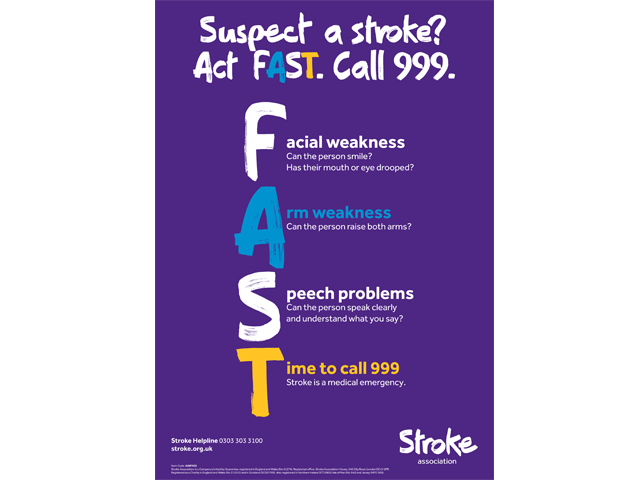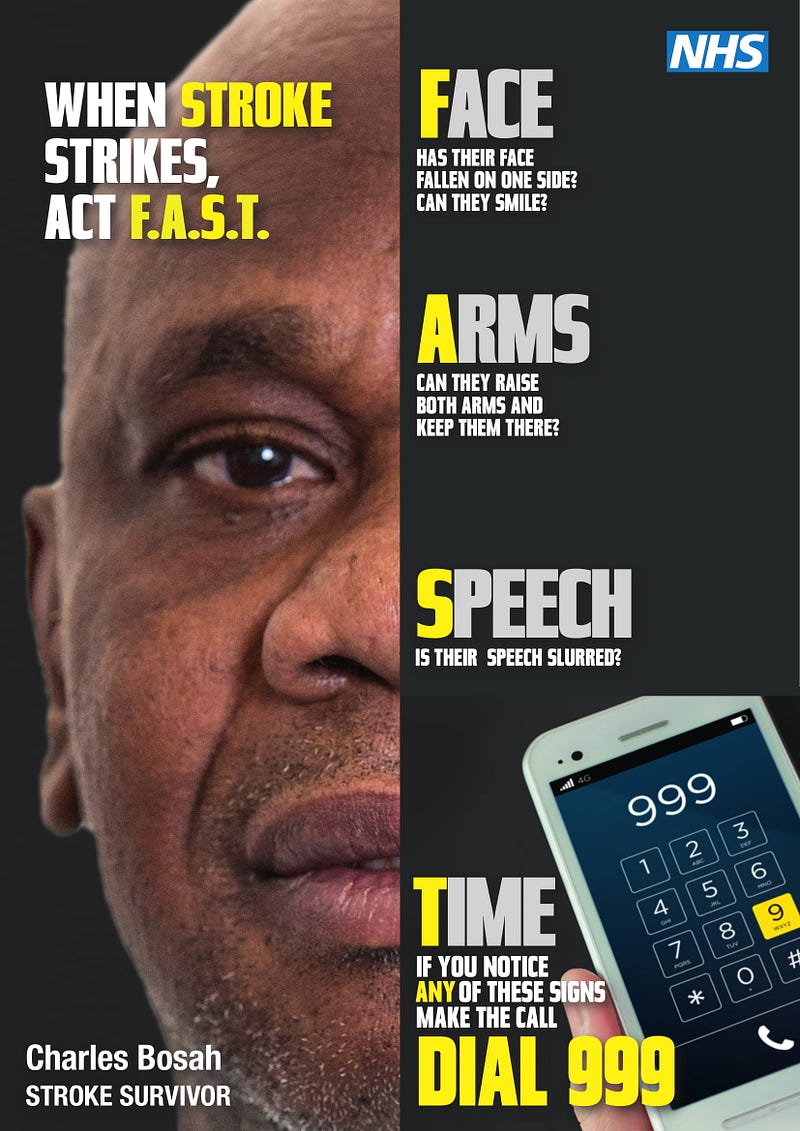How to tell if your brain is under attack
You move through life, your body happily pumping blood around to all of your organs, and then one day something goes wrong. The blood stops reaching a part of your brain. You’re having a stroke.
There are various different types of stroke, but the key thing is the same, the brain suffers an attack, and begins to lose oxygen and nutrients, damaging or killing brain cells. The effects can differ depending on which part of the brain is affected, and for how long, because of this it is essential to know the signs of stroke, to enable you to act FAST, and minimise the damage.

F.A.S.T. Is the recognised acronym to help us remember stroke symptoms.
Face — The face is affected by stroke. Can the person smile? Has their face gone “droopy” on one side?
Arms — Arm weakness is also part of stroke. Can the person raise both arms and keep them there?
Speech — Speech can be affected. Can they speak clearly and understand you? Is their speech slurred?
Time — Time is essential in stroke treatment. If they have the three symptoms, call 999 immediately.
As with many conditions, there are other symptoms, and they do not need to have all of them for you to call for help. If you suspect stroke, call 999. Paramedics are trained in stroke.
Here are some of the other signs of stroke:
- Sudden weakness/numbness on one side
- Difficulty finding words/speaking in clear sentences
- Sudden blurred vision/loss of sight in one or both eyes
- Sudden memory loss or confusion, and dizziness
- Sudden fall
- Sudden severe headache
Types of stroke and prevention
There are three different types of stroke. The most common is an ischaemic stroke, which is caused by a blockage cutting off the blood supply. Haemorrhagic strokes can be caused by bleeding in or around the brain. There is also something called transient ischaemic attack (TIA), which is a “mini stroke”, and the blockage stopping the blood flow is temporary.
Our arteries naturally become thicker as we get older, but a condition called atherosclerosis causes fatty build ups inside the arteries, and make blockages more likely to occur. There are lifestyle factors that can lead to atherosclerosis, and by avoiding those, you can help lower your risk of stroke.
Small vessel disease is when the tiny blood vessels in the brain are damaged. Over time, deposits can collect in them and cause blockages. High blood pressure is a major risk for small vessel disease.
Some heart conditions such as atrial fibrillation (irregular heart beat) and a “hole in the heart” can cause blood clots to form in your heart, which then pass into the blood vessels and up to the brain, causing stroke.
Prevention?
Smoking — It’s bad for your lungs, bad for your heart, and yep, also bad for your brain. Smoking can lead to those fatty build ups and cause blockages.
Exercise — Well, the lack of it. Keeping your body moving helps prevent those build ups.
Unhealthy food — Foods high in bad fats can lead to atherosclerosis so good nutrition is important.
This will be shocking to hear, but not smoking, exercising, and eating healthily can help your body work better!
Other conditions such as high blood pressure, high cholesterol, and diabetes also increase the chance of fatty deposit build up.
What happens next?
The after effects of stroke can vary in severity, and may be less severe based on the speed of treatment. They include:
- Impaired movement/balance, often on just one side
- Communication problems, either mentally with using language (but their intelligence is unaffected), or physically due to muscle weakness in the face causing slurring
- Memory, focus and cognition problems
- Problems noticing things on one side
- Vision problems
- Problems swallowing
- Continence problems
- Fatigue
The physical side of things can be huge, but what is often less discussed is how stroke can change a person mentally, both as a result of the emotional impact causing anxiety, stress and depression, but also full changes in behaviour.
Georgina’s partner suffered multiple TIAs, and she describes the changes to him as subtle at first. He had a loss of concentration, and a loss of memory. With that came moodiness, a loss of patience, a lack of inhibitions, and selfishness. He went from incredibly generous, truthful, and family orientated to only caring about himself and not worrying how he achieved what he wanted. He seemed unaware of the changes, as though it was less a decision to change life having had a close call, and more that his brain changed his personality.
The effect on their life, and their family has been immense, and his is one of the “good” outcomes if you think of it in purely physical terms.
Remember — act FAST. The sooner that a person suffering from stroke receives medical attention, the higher the chances of a positive outcome.

You may also be interested in further information about: back pain, liver health, BMI, strategies to combat stres.
DocHQ Ltd is a Health Tech company improving choices. We help you connect efficiently to health support and advice whether you are at home, work or travelling. See our website for our services or call us on 0330 088 0645.



